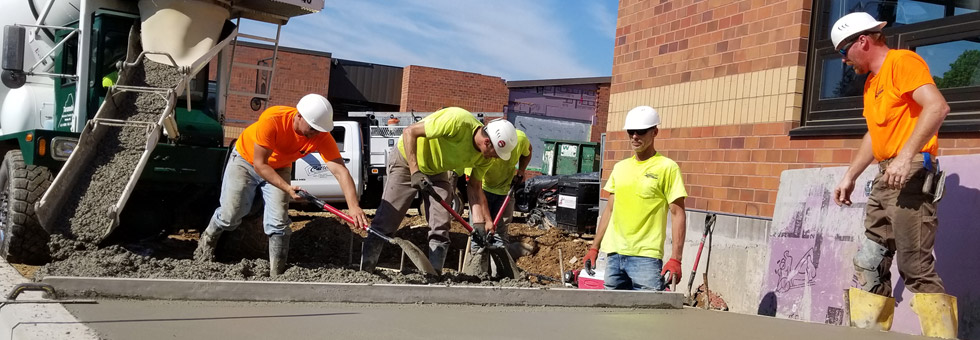Individual Members
The heart of the union is every individual member. Unions are democratic organizations that take the principles of representative government and apply them to the workplace so that collectively workers have a greater influence over the wages and benefits they receive, the conditions in which they work, and their standard of living.
Individually, each member has rights and responsibilities defined and protected by the LIUNA Constitution as well as by state and federal law. As in any democratic organization, members of the union elect fellow members to represent their interests and to serve as officers responsible for the daily operation of the union at the Local, District Council, Regional, and International levels.
The Local Union
The local union is the first and most immediate source of service to members. Local unions are responsible for referring members to jobs; protecting laborers' jurisdiction; handling grievances against employers at the initial stages; organizing new members; collecting dues; holding monthly meetings; and serving as the primary contact on matters and issues related to membership.
The officers of the local union consist of the President, Vice President, Recording Secretary, Secretary-Treasurer, Business Manager, Sergeant-at-Arms, three Auditors, and members of the Executive Board.
The Business Manager is the recognized representative of the local union and sees that the affairs and business of the Local Union are being properly conducted in accordance with the Constitutions and with the rules, regulations, policies, practices and lawful orders and decisions.
The Executive Board is composed of seven members, including the President, Recording Secretary, Secretary-Treasurer, Business Manager, and depending on the combination of officers, at least two other members elected by the membership. It is the duty of the Executive Board to see that the affairs and business of the local union are being properly conducted, in accordance with the Constitution.
The District Council
The Wisconsin Laborers' District Council functions as a coordinating and governing body to develop and implement programs. The Council also serves to mediate problems as they develop between local unions and facilitate the resolution of jurisdictional or other issues between locals and other building trade unions.
In addition, the District Council negotiates and ratifies, with few exceptions, every collective bargaining agreement in the state. Its negotiating committees, composed of District Council delegates, make recommendations on contract language and package increases.
Each local union is represented at the District Council by delegates, in numbers apportioned by the size of the local. All delegates are elected to the District Council at the local union level by rank-and-file members.
Officers of the District Council are elected by delegates to the District Council and include the following offices: President, Vice-President, Business Manager, Secretary-Treasurer, Sergeant-at-Arms, and Auditor.
Delegates to the District Council serve as trustees or representatives to various funds and committees. Trustees to the Wisconsin Laborers' Health and Pension Fund, the Wisconsin Laborers' Apprenticeship & Training Fund, and LECET, as well as members of standing committees, such as political action, job targeting, and negotiating committees for statewide agreements, are all composed of District Council delegates.
The Wisconsin Laborers' District Council also publishes newsletters and other printed and digital communications in an effort to keep members informed about various programs and issues of concern to LIUNA members and their families.
The Regional Office
The next level in the structure is the Regional Office. There are 10 Regional Offices in the United States and 2 sub-regional offices in Canada.
Regional Offices have a geographic jurisdiction. Wisconsin is a part of the Great Lakes Region, which includes the District Councils of Chicago, Michigan, and Minnesota-North Dakota. Regional Offices carry out the policies of the International Union, as well as provide direct services to the District Councils, local unions, and individual members. Regional Managers, appointed by the LIUNA General Executive Board are responsible for the daily operation of Regional Offices and serve under the supervision of the General President.
(For more on the General Executive Board, see Article VIII of the LIUNA Constitution. For more on the duties and responsibilities of LIUNA officers, see Articles IV - XI of the LIUNA Constitution.)
The International Union
At the International Union level, decisions are made by the General Executive Board, which is composed of the General President, the Secretary-Treasurer, and 14 International Vice-Presidents.
Every 5 years the International holds a convention to set policies and to nominate candidates for the General Executive Board. Delegates to this convention are elected from all LIUNA local union affiliates and District Councils.
Every member in good standing votes for the General President, General Secretary-Treasurer, and 4 at-large Vice-Presidents. Nine Regional Vice-Presidents are also elected by the vote of rank-and-file members from each of the respective regions. One Vice-President serves on the General Executive Board by virtue of his elected position as president of the Mail Handlers Union.
LIUNA headquarters in Washington D.C. is the source of a variety of support and service to our members. At LIUNA headquarters there are departments and staff who work daily to service the membership by responding to the demands and issues of a changing construction industry, monitoring members' basic health, welfare, and pension benefits, defending our position on legal issues, voicing concerns to lawmakers on issues important to construction workers and our families, and organizing new members.
The International assigns a representative to assist local unions and District Councils on matters that affect and/or impact International policies or decisions.


